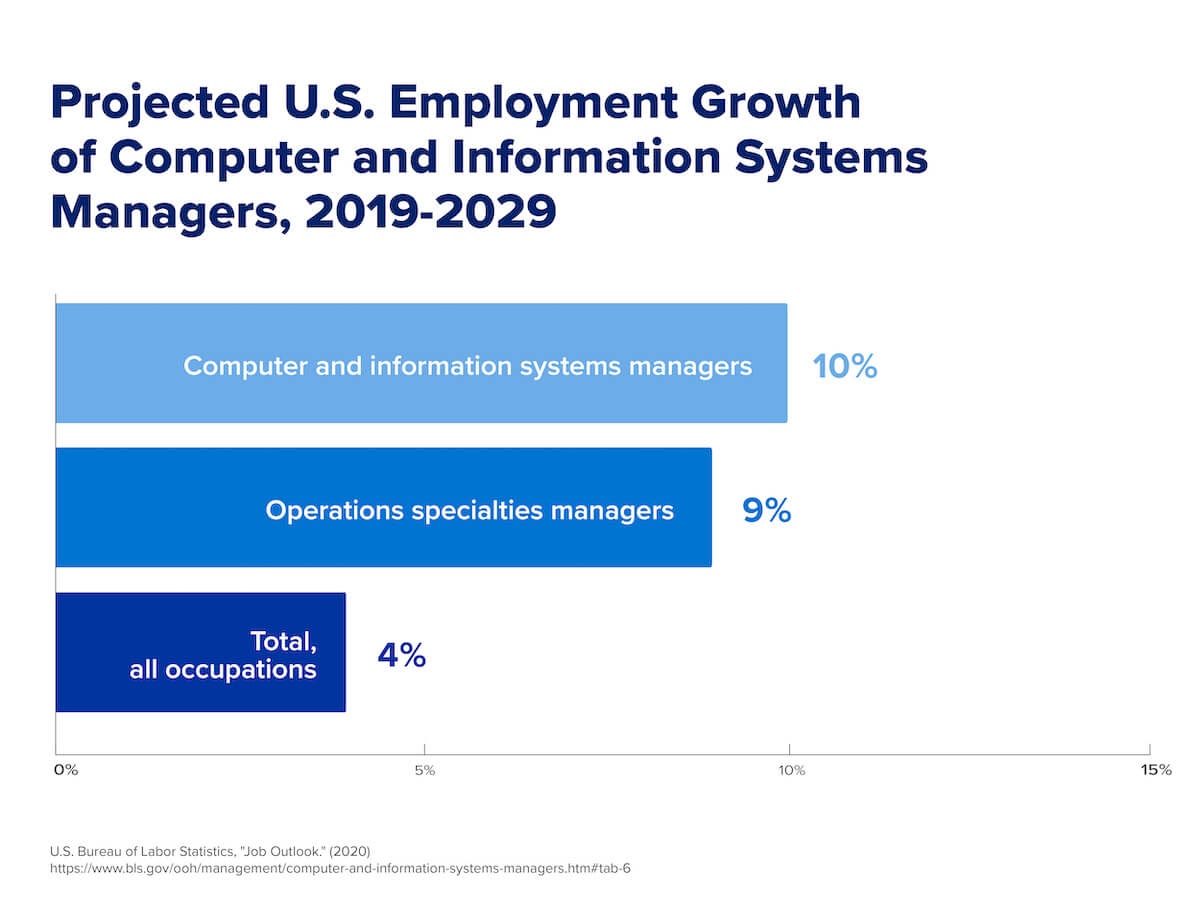Have you tried turning it off and on again?
For all the sitcom jokes based around the IT profession, there can be no question that top-notch technical professionals provide incredible value to their employers and consumers. These tech-savvy professionals have a functional knowledge of information systems, software, and systems analysis. Most are leaders; they know how to manage personnel, oversee projects from design to completion, and are comfortable making big decisions.
It’s a great career with fantastic growth potential — and if you’re wondering how to become an IT project manager, you’ve come to the right place. In this blog post, we’ll outline the requirements needed for project managers, the position’s responsibilities, and why a technical project management career path might be right for you.
5 Steps to Becoming an IT Project Manager
Information technology project managers need education, training, and experience to be successful. Here’s a guide to pursuing an IT career from square one.
1. Get Some IT Experience
Before figuring out how to become an IT project manager, you must understand how to design, implement, and troubleshoot projects.
Not sure where to start? Consider dabbling in a few low-level IT roles! According to the U.S. Bureau of Labor Statistics, IT project managers typically have several years of experience working in information technology.
As an aspiring IT project manager, you could gain some valuable experience by working as a technical support specialist or network systems administrator. Similarly, because web developers and software engineers understand the programming requirements involved in a large project, it’s usually relatively easy for people in these positions to upskill into a project management role.
That said, you may need to strategize your career progression if you plan to break into a specific field. To become a hospital IT manager, for instance, experience in health care is necessary. If you have a particular industry in mind, seek out roles that will springboard you in the right direction.
2. Obtain the Necessary IT Project Management Skills
Anyone wondering how to become an IT project manager needs to have a sturdy set of fundamental tech and organizational skills. The most common means of obtaining them is by attending a college program and earning a degree in a field such as computer science, software development, or MIS (management information systems).
But if you’re wondering how to become an IT project manager without a degree, never fear — you have other options.
Bootcamp
Those who don’t have the time, money, or inclination to commit to a four-year degree program can obtain the necessary skills via a bootcamp as long as they are willing to put in the hard work required to pursue this accelerated learning path.
A tech project management bootcamp offers an accelerated but thorough entry point into the field. After three to six months of rigorous online study, you can become fluent in many aspects of modern project management.
A bootcamp also encourages you to apply your theoretical knowledge to real-world project management tasks through hands-on projects and workshops. The online curriculum provides participants with a flexible learning environment — and gives professionals who don’t have prior project management experience a chance to break into the field. These intensive courses are similarly ideal for those who have a degree in a non-tech field and need to brush up on their industry skills.
It’s worth noting that many of these courses are well-respected, too. According to a 2017 study from Indeed, a full 72 percent of employers think that bootcamp learners are “just as prepared and likely to be high performers” as conventional graduates and 12 percent believe bootcamp learners are even better job candidates. Don’t underestimate the value of an unconventional education!
 On-the-Job and Independent Learning
On-the-Job and Independent Learning
Some professionals may not need to formally upskill at all — although it is worth noting these cases are relatively rare.
That said, if you have several years of experience working in an IT-relevant position and have a chance to learn project management and advanced technical skills on the job, you may be able to land a promotion based on your current experience alone.
To give yourself a better shot, you may want to consider pursuing certification and/or taking a few online classes to expand your networking and IT skills. Keep in mind that this route is usually only suitable for those who are highly motivated and already have a wealth of IT knowledge. If you’re an inexperienced beginner wondering how to become a tech project manager without a degree, a bootcamp is probably your best bet.
3. Hone Your Soft Skills
Tech project managers need a balanced set of technical and management skills to be successful. While “hard” technical skills are obviously necessary for IT professionals, it’s crucial not to underestimate the “softer” skills — i.e., those related to managing time, people, and resources.
These are some of the soft skills most valuable to IT project managers:
Leadership
IT project managers, by definition, need to manage teams. As such, it’s essential to know how to motivate people, inspire teamwork, and make timely decisions in project management.
Communication
It doesn’t matter whether you chat over Slack or face-to-face; communication skills are vital for project managers. Be clear, direct, and open with your team. But remember, the best communicators don’t just talk to their direct reports — they listen and respond to feedback, too.
Conflict Resolution
Managing personnel doesn’t always go smoothly. IT project managers must establish clear workplace policies, implement protocols, and occasionally defuse disagreements.
Organization
Maintaining budgets, tasks, and deadlines requires diligent organization. All aspiring project managers need to be detail-oriented and have excellent time management skills.
Additional Resources
- 10 Skills You Didn’t Know Could Land You an IT Job — CompTIA
- How to Identify and Develop Soft Skills — Glassdoor
- 21 Soft Skills for Leadership Success — Indeed Career Guide
4. Prepare for the Job Hunt
Once you’ve completed your education and accumulated the necessary job experience, you can start looking for jobs.
Generally speaking, your first step should always be to craft a resume and portfolio that will wow employers. Your resume should spotlight your education, experience, and any soft skills you might have accrued throughout your educational and professional experience. Your portfolio — a collection of your best projects and professional achievements — should provide a real-world illustration of the skills highlighted in your resume.
That said, your job preparations shouldn’t start and end with a few polished documents.
Networking with leaders in industries you find attractive can generate even more opportunities. For those figuring out how to become an IT project manager, internships and mentorships can help open professional doors. Having someone to provide guidance and support carries great value.
Additional Resources:
- Information Technology (IT) Resume Tips and Examples — The Balance Careers
- Why You (Yes, You) Need a Professional Portfolio — The Muse
- The Ultimate Interview Guide: 30 Prep Tips for Job Interview Success — The Muse
5. Apply for Jobs
Whether you’re transitioning to project management or looking for a promotion, it’s important to be patient and persistent in the job hunt. Look for jobs that match your qualifications — but don’t be afraid to be ambitious! You don’t need to have every single capability listed on a job ad to be a competitive candidate. “Soft” factors like personality, cultural fit, and workplace attitude all play a role in a hiring manager’s decision making process.
Know that your experience and personality will weigh in your favor even if you haven’t been an IT project manager before. Someone out there is looking for you!
What Does an IT Project Manager Do?
IT project managers start, plan, execute, and close projects; they also ensure that their tech departments operate as efficiently as possible.
These high-level professionals typically supervise teams of technical and support specialists that design and build software, applications, and other programs that are instrumental to a company’s operations. Their responsibilities include oversight of all project aspects, including scheduling, budgets, and communicating progress to superiors and customers.
Roles can be delineated further into IT project managers and tech project managers. What’s the difference? Let’s examine them:
IT Project Management vs. Tech Project Management
IT project managers generally oversee the computer, engineering, or other technical aspects of a project. They are the experts who shape the project and diagnose and resolve issues if needed. They also translate tech talk to team members who aren’t fluent.
So, what does a technical project manager do? They oversee the total project, from startup to close, ensuring its success. Tech project managers are responsible for day-to-day operations and people management of an assignment. They keep customers and key stakeholders current on a project’s progress and provide approval on all major decisions.
To put the difference simply — IT project managers deal with the technical details while tech project managers handle the big picture.
What Tools Do IT Project Managers Use?
Project management software abounds, from free versions to paid platforms for every budget and need. If you want to become an IT project manager, you’ll need to know at least a few of the most common digital collaboration tools.
Not sure where to start? Here’s a quick checklist of a few technologies you should know before wading into the job pool:
- Microsoft Project
- Wrike
- Trello
- Planio
- Video-conferencing software such as Zoom, Skype, and Google Meets
- Slack
- Graphics software such as SmartDraw and Microsoft Visio
Every tech project requires team collaboration. These platforms make interpersonal efforts easy to facilitate — and, as such, are invaluable for aspiring IT project managers.
Career Paths in IT and Tech Project Management
In technical fields, project managers often begin their careers as programmers. They have experience with programming languages and are knowledgeable in project management methodologies such as Agile and Waterfall.
After a few years, these professionals can set the groundwork for a career in IT project management by gaining supervisory experience. They can accomplish this by taking on smaller-scale managerial duties — i.e., overseeing a specific project aspect or a small team. During this process, aspiring tech project managers may also want to seek any additional training or education they need to qualify for a higher-level role.
Careers in IT and tech project management offer considerable room for growth and advancement. After they gain experience and prove their leadership mettle, project managers can rise into executive fields as senior directors or even chief officers.
How to Get an Entry-Level IT/Tech Project Management Job
As discussed earlier, your first steps should be to gain an education and craft a knockout resume and portfolio. Be sure to sell your soft skills as well as your technical skills!
To accelerate your IT project management career path, pursue entry-level jobs that naturally lead to supervisory positions. Programming, database management, or IT security are excellent places to start, as are roles such as project coordinator, office manager, or marketing assistant. Getting in the door is the first step toward becoming a tech project manager.
Certifications
Certifications make IT project managers more valuable to employers. They demonstrate your proficiency with specific project management skills and underscore your willingness to embrace an expanded role.
For aspiring project managers, certifications are more than a resume point; they show employers that you have the expertise to deliver on their IT initiatives. Here are a few to consider:
Agile Certifications
Agile has become an essential framework of project management. At its core, Agile values individuals and collaboration above processes and plans. Certifications are available in methods such as Agile Project Management, Scrum, and Scaled Agile Framework, among others.
Certified ScrumMaster
If Agile is a philosophy of project management, Scrum is a specific Agile methodology. Certified ScrumMasters ensure that their teams follow the Agile principles in completing a project.
Project Management Professional
To pursue this certificate, you will need experience as a project manager. It is one of the most valuable certificates for project managers seeking career advancement.
Certified Associate in Project Management
This is an entry-level certification for project managers seeking to become Project Management Professionals.
CompTIA Project+
Designed for professionals who oversee small- to mid-sized projects, this certification benefits managers who work in IT or other fields.
Additional Resources:
- Agile Certifications for Every Step in Your Career — Project Management Institute
- Become a Certified ScrumMaster — Scrum Alliance
- Project Management Professional Certification — Project Management Institute
- Certified Associate in Project Management — Project Management Institute
- CompTIA Security+ Certification — CompTIA
How Much Do IT/Tech Project Managers Make? Job Outlook and Salaries
The job and salary outlooks for IT and tech project managers are promising. According to the U.S. Bureau of Labor Statistics, the need for computer and information systems managers will grow by 10 percent through 2029. By comparison, the average job growth for all occupations is just four percent.
 What, then, are the prospects for a technical project manager salary? BLS data sets the annual mean salary for computer and systems project managers at $97,340, which will vary depending on the field of work, the company’s size, and the candidate’s experience level. Project management specialists are needed across the country, though California, Texas, and Florida employ the highest numbers.
What, then, are the prospects for a technical project manager salary? BLS data sets the annual mean salary for computer and systems project managers at $97,340, which will vary depending on the field of work, the company’s size, and the candidate’s experience level. Project management specialists are needed across the country, though California, Texas, and Florida employ the highest numbers.
The same data further indicates that the New York/New Jersey/Pennsylvania corridor has the second-highest regional employment level for technology project managers. In fact, Columbia Engineering’s home of New York is the fourth-highest paying state for project managers. In the New York region, according to CareerOneStop, opportunities for project managers are expected to grow considerably faster than the national average.
Remote work, of course, has changed the nature of some IT project management opportunities, allowing managers to telecommute across the country. This will naturally vary by project and company but is becoming a more viable work option.
Should You Become an IT Project Manager?
Information technology delivers exciting career prospects and the chance to advance into management. Through an entry-level position, IT professionals can climb into roles as IT or tech project managers.
As project managers gain more experience and certifications, they can pursue higher positions as technology officers or even chief executives. The potential for career expansion is substantial.
If you have been exploring options for career growth, IT project management could be a good fit. Not sure how to start walking an IT project manager career path? Columbia Engineering Technology Project Management Boot Camp is a great place to start, especially for those with degrees in a field other than information technology or project management.
The course teaches you the tools to become an IT or tech project manager without any experience. Upon completing the 18-week bootcamp, you will have the technical training and hands-on experience to create and manage a project from start to finish. You also will develop a professional portfolio highlighting your skills.
If you have the will and interest to pursue a career as an IT project manager, consider exploring our course offerings to start charting your own path in the field.

 Live Chat
Live Chat